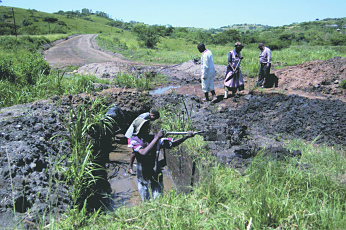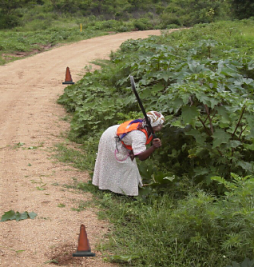


Zibambele
Labour-based Construction and Maintenance Programme
The fact that KwaZulu-Natal hosts 21% of South Africa’s poor and that 75% of the poor live in rural areas indicates that there is very
substantial scope to use labour-based methods in the construction and
maintenance of rural access roads.
Roads are built where people live and therefore their
construction and maintenance creates work opportunities for those who are least
mobile. Further, roads can be designed to create work and entepreneurial
opportunities which fit the skills profile of of local communities. supply of
work in rural communities far exceeds its demand. This in itself provides a
compelling case to invest in labour-based construction methods. The use of
labour-based methods also addresses a wider range of other critical problems:
- It creates employment opportunities for those least able to
compete on the job market.
- Labour-based construction methods are supervision intensive
and therefore create significant local administrative and management
opportunities for the educated unemployed.
- Work can be timed to absorb labour during the agricutural
off season. In this way the safety nets of rural households can be
strengthened.
- Labour-based construction methods place a strong emphasis
on local labour, local expertise and locally available materials. This results
in considerable savings in foreign exchange associated with imported machine,
fuel, materials and expertise.
- Training on the technical aspects of road construction as
well as the administrative aspects of project management is provided.

Labour-based methods in road construction and maintenance
are cost efficient and at the same time empower local communities.
The maintenance of rural access roads through labour-based
methods is addressed by the Development Directorate’s Zibambele programme. The
Development Directorate is currently reviewing the results of the pilot projects
with the intention of developing a programmatic approach to labour-based
methods.
A spin off of labour-based methods which might be unique to the KwaZulu-Natal situation is the contribution that such projects make to conflict
resolution and sustainable peace. This is well illustrated by the Nkonjane
Project at khaKhandisa close to the University of Zululand. During the 1990’s
this area was severely disrupted by political violence. The area is
characterised by massive unemployment even of young people with tertiary
education, degrees and diplomas. The Nkonjane project was motivated to the
Department of Transport by youth in the area to create desperately needed work
opportunities. Over 80 people, predominantly youth, were employed on the project.
The project cemented an important peace process that was driven by youth. It is a
good example of community and government working together to build social and
physical infrastructure that will benefit all in the years to come.
Labour-based methods in road construction and maintenance are
cost efficient and at the same time empower local communities.
Zibambele
The Zibambele Road Maintenance Contract System is a poverty
alleviation programme creating sustainable jobs for poor rural families while
they maintain rural roads. In order to break poverty cycles in the medium to
long term the Department employs a household rather than an individual. This
ensures that a household does not rely on one person for continuity of the
contract.
Zibambele is a routine road maintenance programme using labour
intensive methods. It encourages flexible working hours thus allowing households
adequate time to deploy their labour on other activities.

Zibambele has already achieved more than one third of the targeted
40 000 contracts.
A Zibambele household will maintain the road drainage system,
ensure good roadside visibility, maintain the road surface in good condition,
and clear the road verges of litter and noxious weeds.
- The length of the road allocated to each household depends on
the difficulty of the terrain, the more difficult the terrain the shorter the
length of road.
- The maintanance need of the road is based on a maximum of
sixty working hours per month.
- A Zibambele contract is awarded for twelve months and is
renewed annually.
- Contracts target the poorest of the poor, who are identified
and selected by their own community.
- Zibambele focuses on woman headed households who make up the
majority of the poorest families.
- Training includes technical skills on road maintenance and
social development and life skills.
- Support services include assisting contractors to, obtain
identity documents, open bank accounts, organize themselves collectively into
credit unions, and invest savings in other productive activities.
In order to facilitate the cost effective supervision and
training of contractors the Development Directorate has piloted the organization
of Zibambele contractors into savings clubs. A constitution, developed in
consultation with Zibambele contractors, has been prepared. This allows the
Development directorate to roll out the establishment of Zibambele Savings Clubs
from the original pilot initiatives. The purpose of the Savings Club initiative
is to strengthen Zibambele contractors’ roles in rural enterprise development
and provide the institutional framework to create wealth amongst the poorest of
the poor.
An independent evaluation of Zibambele by SALDRU (University of
Cape Town) found Zibambele to be both a cost efficient road maintenance system
and a cost effective poverty alleviation programme. The SALDRU finding, in
2001/2002, that seventy three cents of every rand spent within the programme
accrued to Zibambele contractors compares very favourably with other poverty
alleviation programmes both in South Africa and internationally. Zibambele was
piloted by the Development Directorate in 1999/2000, (2 700 contracts issued).
Zibambele has already achieved more than one third of the targeted contracts.
 |
For More Information Contact
KwaZulu-Natal Department of Transport
172 Burger Street, Pietermaritzburg, 3201
Private Bag X9043, Pietermaritzburg, 3200
Republic of South Africa |
|
 |

 back
back
|
![]()